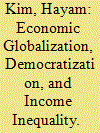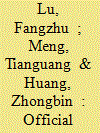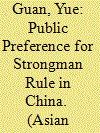|
|
|
Sort Order |
|
|
|
Items / Page
|
|
|
|
|
|
|
| Srl | Item |
| 1 |
ID:
192232


|
|
|
|
|
| Summary/Abstract |
In the last 40 years, East Asian countries have undergone significant economic and political transformation, with deepening integration into the world economy and substantial progress toward democracy. I investigate the impact of these two major developments on income distribution in East Asia. This study extends prior research by (1) examining the role of both international economic and domestic political factors, topics that have mostly been studied separately; (2) employing inequality data that are more complete than those used in previous studies; and (3) using data for a period during which the pace of globalization greatly accelerated, a major relevant event (the Asian financial crisis) occurred, and several countries in the region witnessed a considerable expansion of democratic rights. Evidence for the claim that trade increases inequality is robust, but empirical support for the redistributive effects of both foreign direct investment and democracy is weak.
|
|
|
|
|
|
|
|
|
|
|
|
|
|
|
|
| 2 |
ID:
192229


|
|
|
|
|
| Summary/Abstract |
The salience of the immigration issue has increased in Japan due to the pressures of labor shortages and an aging population. However, little research has examined what predicts anti-immigrant sentiment and how it relates to the voting behavior of Japanese people. Using nationally representative survey data, this article digs deeper into public opinion on immigration by testing a variety of economic, social, and demographic variables associated with different dimensions of anti-immigrant sentiment. I find that whereas economic concerns are based on realistic assessments of job threats posed by immigration, cultural and security concerns are driven primarily by stereotypes of immigrants. Using this evidence, I examine the relationship between immigration attitudes and voting choice. Economic and security concerns about immigration are correlated with actual voting choices, but I see no evidence that cultural threats have a meaningful effect on Japanese voting decisions.
|
|
|
|
|
|
|
|
|
|
|
|
|
|
|
|
| 3 |
ID:
192230


|
|
|
|
|
| Summary/Abstract |
Social media is the most popular platform for the expression of public opinion, and it is a critical channel through which researchers can observe the dynamics and patterns of public opinion. This study explores the political origins of Chinese nationalism by focusing on how official media shapes mass nationalism in Cyber China. Analyzing 26 million Weibo posts made during the coronavirus (COVID-19) pandemic, we found significant variations in nationalism among user types, localities, and stages of the pandemic. Unlike previous studies, we found that the official Chinese media did not always play the expected role of promoting nationalism; instead, it acted as a system of emotional valves that channeled social sentiment. Official media is intended to stabilize social sentiment and prevent social unrest, and nationalistic news stories are used to draw attention away from domestic problems.
|
|
|
|
|
|
|
|
|
|
|
|
|
|
|
|
| 4 |
ID:
192231


|
|
|
|
|
| Summary/Abstract |
After three decades of collective leadership, strongman rule has returned to China. But do the Chinese people prefer this political system, characterized by a leader with unchecked power? Using four waves of data from the World Values Survey, this study finds, first, that from 2001 to 2018, public preference for strongman rule in China was moderate compared to other countries. Second, the Chinese people expressed a growing desire for a strongman from 2001 to 2007 and again in 2012, but this desire did not increase further between 2012 and 2018. Third, in the 2000s, trust in the central government was negatively associated with strongman preference, while in the 2010s, perceptions of national crisis and political socialization became increasingly relevant. This study evaluates the degree, dynamics, and possible drivers of public preference for strongman rule in China and contributes to the understanding of political strongmen and their popular bases worldwide.
|
|
|
|
|
|
|
|
|
|
|
|
|
|
|
|
| 5 |
ID:
192227


|
|
|
|
|
| Summary/Abstract |
Given their citizens’ religiosity, the presence of religious parties, and the salience of religion in the politics of India and Pakistan, it is likely that politicians in both of these countries vary considerably in how religious they are. How do these differences influence their political and policy choices? We know surprisingly little about this question. This paper uses data from survey experiments fielded to politicians in India (in 2019) and Pakistan (in 2018) to examine how religiosity is correlated with politicians’ risk-taking behaviors. Given that research finds they are correlated in citizens and the ubiquity of both risk and religion in politics, understanding this relationship is important. The experimental data reveal that in both countries highly religious and less religious politicians make very different choices on a risky policy decision. Highly religious politicians are risk-seeking in India but risk-averse in Pakistan. While the less religious politicians approximate rational actors, the highly religious politicians violate both rational actor and prospect theory decision-making models.
|
|
|
|
|
|
|
|
|
|
|
|
|
|
|
|
| 6 |
ID:
192228


|
|
|
|
|
| Summary/Abstract |
In this article, we trace the strategy of political control employed in North Korea under Kim Jong Un. Using conceptual tools created in the literature on comparative authoritarianism, we consider the roles of repression, co-optation, coercive distribution, and containment with respect to how the North Korean regime responds to external and internal threats. We focus on two areas as case studies in differentiated, contingent political control strategies. First, we consider the role of border as a conduit for unauthorized goods, migrants, and illicit information and the regime’s regulation of it. Second, we examine the regime’s management of internal economic actors, namely urban entrepreneurs and farmers. The main argument of this article is that Kim Jong Un has employed a policy of simultaneous co-optation, repression, and latterly under COVID-19, reemergent coercive distribution, building on but also modifying the strategic approaches pursued under Kim Jong Il.
|
|
|
|
|
|
|
|
|
|
|
|
|
|
|
|
|
|
|
|
|